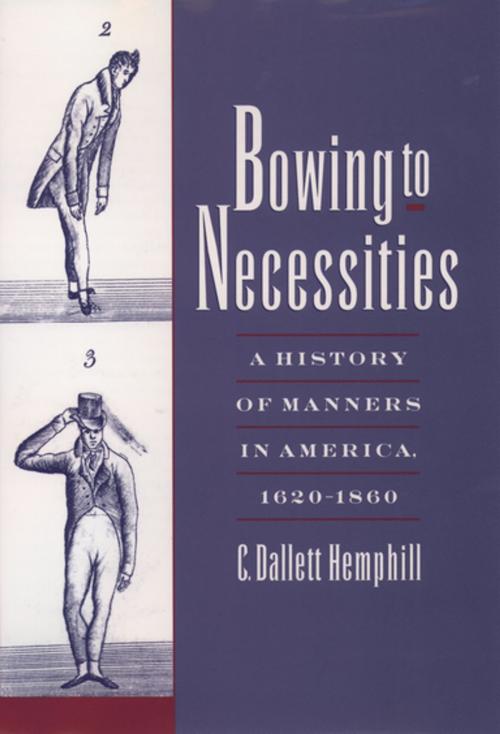Bowing to Necessities
A History of Manners in America, 1620-1860
Nonfiction, History, Americas, United States| Author: | C. Dallett Hemphill | ISBN: | 9780190284312 |
| Publisher: | Oxford University Press | Publication: | September 23, 1999 |
| Imprint: | Oxford University Press | Language: | English |
| Author: | C. Dallett Hemphill |
| ISBN: | 9780190284312 |
| Publisher: | Oxford University Press |
| Publication: | September 23, 1999 |
| Imprint: | Oxford University Press |
| Language: | English |
Anglo-Americans wrestled with some profound cultural contradictions as they shifted from the hierarchical and patriarchal society of the seventeenth-century frontier to the modern and fluid class democracy of the mid-nineteenth century. How could traditional inequality be maintained in the socially leveling environment of the early colonial wilderness? And how could nineteenth-century Americans pretend to be equal in an increasingly unequal society? Bowing to Necessities argues that manners provided ritual solutions to these central cultural problems by allowing Americans to act out--and thus reinforce--power relations just as these relations underwent challenges. Analyzing the many sermons, child-rearing guides, advice books, and etiquette manuals that taught Americans how to behave, this book connects these instructions to individual practices and personal concerns found in contemporary diaries and letters. It also illuminates crucial connections between evolving class, age, and gender relations. A social and cultural history with a unique and fascinating perspective, Hemphill's wide-ranging study offers readers a panorama of America's social customs from colonial times to the Civil War.
Anglo-Americans wrestled with some profound cultural contradictions as they shifted from the hierarchical and patriarchal society of the seventeenth-century frontier to the modern and fluid class democracy of the mid-nineteenth century. How could traditional inequality be maintained in the socially leveling environment of the early colonial wilderness? And how could nineteenth-century Americans pretend to be equal in an increasingly unequal society? Bowing to Necessities argues that manners provided ritual solutions to these central cultural problems by allowing Americans to act out--and thus reinforce--power relations just as these relations underwent challenges. Analyzing the many sermons, child-rearing guides, advice books, and etiquette manuals that taught Americans how to behave, this book connects these instructions to individual practices and personal concerns found in contemporary diaries and letters. It also illuminates crucial connections between evolving class, age, and gender relations. A social and cultural history with a unique and fascinating perspective, Hemphill's wide-ranging study offers readers a panorama of America's social customs from colonial times to the Civil War.















